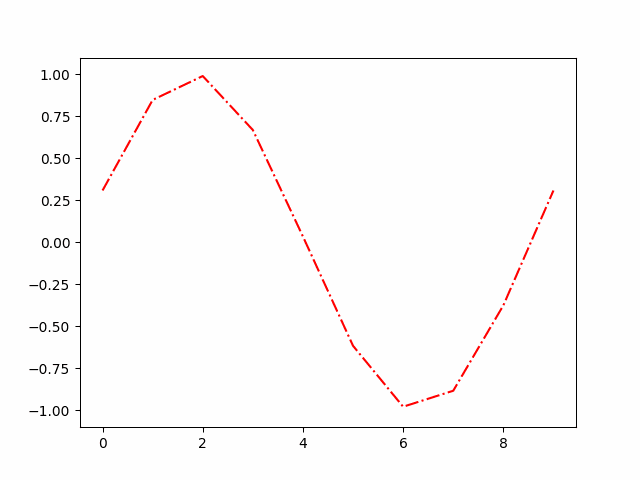基于Python-matplotlib 的动画绘制问题
最最简单的操作
import numpy as np
import matplotlib.pyplot as plt
fig = plt.figure()
ax = fig.subplots()
x = np.linspace(0,10,100)
y = np.sin(x)
while True:
ax.plot(x,y)
plt.pause(1)
ax.cla()
x += np.pi/30
y = np.sin(x)
有人会问,为什么不能直接 用 plot 替代 ax 呢?
好问题,你可以一试,会发现这玩意没法关掉 。。 当然 ctrl + C等暴力手段是任何时候都ok的
Animation类
FuncAnimation
import numpy as np
import matplotlib.pyplot as plt
from matplotlib.animation import FuncAnimation| fig | 显示动画的figure对象 |
| func | 更新动画的函数(你得自己写的那一部分) func函数的第一个参数为帧序号。 返回值是更新后的图形对象列表。 |
| frames | 由帧序号组成的列表 frames是数值时,相当于range(frames) 默认值为itertools.count 表示一个从0开始,步长为1的无限递归序列 |
| init_func | 开始帧序号 |
| fargs | 其他需要传递给func函数的参数 |
| interval | 以毫秒为单位的动画更新周期 |
| repeat | 布尔值,默认为True |
| repeat_delayint | 默认为0,单位为毫秒,表示动画循环间隔。 |
| blit | 更新所有点或更新发生变化的点 |
import numpy as np
import matplotlib.pyplot as plt
from matplotlib.animation import FuncAnimation
fig = plt.figure()
ax = fig.subplots()
x = np.linspace(0,10,100)
y = np.sin(x)
ax.set_aspect(3)
ax.plot(x,y,'-.',c='red',label="the old one")
line = ax.plot(x,y,c='green')
plt.legend()
def fun(i):
global x
x += 0.1
y = np.sin(x)
line[0].set_ydata(y)
return line
animation = FuncAnimation(fig,fun,interval=100)
plt.show()
这就有两个问题需要解决一下
第一个:line到底是什么类型的东西
type(line)
明显,这就是。。列表。
第二个:set_data;set_xdata;set_ydata
你可以自己更改一下试试看,结果是显而易见的
ArtistAnimation
它的好处是你不要费尽心机去想一个可能 勾八 的函数了
它的坏处是
一个能用函数表示的动画 为什么要在新增一个列表才能表达呢?
import numpy as np
import matplotlib.pyplot as plt
from matplotlib.animation import ArtistAnimation
fig = plt.figure()
ax = fig.subplots()
frames = []
x = np.linspace(0,np.pi*2,10)
for i in range(20):
x += np.pi*2/20
y = np.sin(x)
frames.append(ax.plot(y,'-.',c='red'))
animation = ArtistAnimation(fig,frames,interval=100)
plt.show()
很好
现在只需要保存动画就圆满了
动画保存
.save()函数
| filename | 画文件名+后缀 |
| fps | 动画每秒的帧数 默认值为 原动画的帧数 |
| dpi | 动画每英寸的点数 默认值为 原动画的点数 |
| codec | 编码格式 默认值为’h264’ |
animation.save("1.gif")
